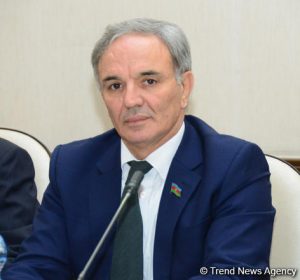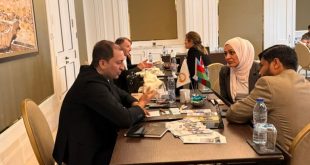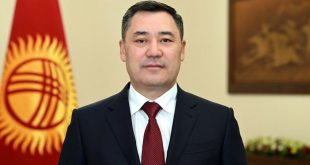
Aflatun Amashov, head of the Azerbaijan-Georgia working group for interparliamentary relations, has appealed to Zviad Dzidziguri, head of the Georgia-Azerbaijan Friendship Group, Trend reports.
It is stated in the appeal that the historical relations of the peoples of Georgia and Azerbaijan in the spirit of friendliness and good neighborliness have always drawn attention by their exemplariness.
“It is rather pleasing that these relations are developing along an ascending line in the modern period, relying on a strategic partnership. From this point of view, great responsibility is placed on the parliaments of Azerbaijan and Georgia, and it is necessary to highlight the work done by the highest legislative bodies of both countries for the deepening of our historical friendship,” the appeal reads.
As is known, Amashov says, a bust of Mikhail Avagyan, a person directly involved in the occupation of the Nagorno-Karabakh region of Azerbaijan and adjacent territories, and in organizing the killings of Azerbaijanis in these territories, was erected in the Georgian settlement of Bugashen of the Akhalkalaki municipality on January 20.
“This has caused a rather negative resonance in the society of our country. We do not want a criminal, whose hands are stained with the blood of the Azerbaijani people, be immortalized as a symbol of heroism. It should be noted that Georgia, like Azerbaijan, suffers from ethnic separatism. Around 20 percent of the territory of Georgia is also under occupation. As a matter of fact, Avagyan distinguished himself by his direct participation in the occupation of the territories of Georgia as well. Actually, he is the enemy of both nations,” Amashev points out in his appeal.
“In the modern period, both nations are united by common pain and suffering. Therefore, the Azerbaijani state always supports the territorial integrity of Georgia and considers this support to be the main priority of its foreign policy in the region.”
The appeal calls upon the members of the Azerbaijan-Georgia working group for interparliamentary relations to keep a principled stance against individuals who seek to undermine the values that unite the two peoples and who attempt to sow seeds of discord between the two peoples.
“We believe that by your principled stance on the matter the bust of the murderer Mikhail Avagyan in the Georgian village of Bugashen of the Akhalkalaki municipality will be taken down. We are confident that you will take a sensitive approach to this issue,” the appeal concludes.
The conflict between the two South Caucasus countries began in 1988 when Armenia made territorial claims against Azerbaijan. As a result of the ensuing war, in 1992 Armenian armed forces occupied 20 percent of Azerbaijan, including the Nagorno-Karabakh region and seven surrounding districts.
The 1994 ceasefire agreement was followed by peace negotiations. Armenia has not yet implemented four UN Security Council resolutions on withdrawal of its armed forces from the Nagorno-Karabakh and the surrounding districts.
 Oval Useful news from Azerbaijan and Caucasus
Oval Useful news from Azerbaijan and Caucasus


